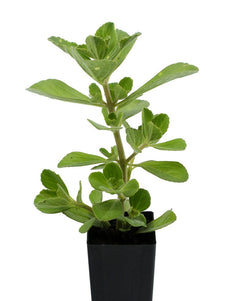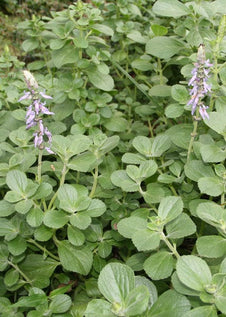







Dogbane
Dogbane
- Low stock - 12 items left
- Inventory on the way

Usually available: All year
Life cycle: Perennial
Height: 15 - 30cm
Position: Sun / part shade
Soil preference: Well drained
This is how we pack and send your Herb Plants to all states except TAS & WA
You will receive
- 1 Dogbane Herb Plant in a 50 X 75mm tube - General growing instructions
All of our Herb Plants are grown organically with certified organic potting mixes and fertilizers
Botanical Name: Plectranthus caninus syn Coleus caninus
Dogbane is a perennial herb from the mint family, which grows to 15 cm high or 30 cm when the flowers stalks appear. The plant takes on the appearance of a semi-succulent, with its light green leaves holding moisture and standing firm. The leaves are narrow and obovate, meaning they are broader above the middle. They may be approximately 3-4 cm long by 2-4 cm wide. The branches are semi-erect and the plant is covered in small hairs. The blue-purple flowers take on a succulent and tubular appearance, before the petals open on the tall inflorescence.
When crushed, the leaves are strongly aromatic, although this is not said to be entirely unpleasant to humans. Dogs and cats are reputed to be able to smell the aroma on intact leaves and be repelled from the plant. This herb is also known as ‘Scaredy Cat Plant’. However, there is no scientific evidence to suggest that these claims are true.
In addition to these colloquial names, dogbane also has two scientific identities. The name Coleus canina is a marketing tag based on the apparent dog repellent actions of the herb. However, the plant belongs to the Plectranthus genus, with the formal species identification being P. caninus.
Although, dogbane is native to South Africa, Plectranthus is a genus with over 250 species, mostly from the southern hemisphere. There are reports that Dogbane is native to a wider variety of regions, including East Africa, India and Southern Asia and Australia. However, this may be more correctly referring to the many similar species, but including the naturalisation of dogbane, which will grow very easily. It is reported to have become naturalised around the Sydney area of NSW.
When researching dogbane, be aware that this name is used for several plants in the Apocynum genus. These are found mostly in the northern hemisphere and look very different to the semi-succulent Plectranthus. Also called Indian hemp, they are also known to be poisonous and have been implicated in animal (dog) toxicity, which is how the name came about.
Growing Conditions
Dog bane prefers full sun to part shade, but may need more shade in very hot areas. If there is too much shade the plant will take on a ‘leggy’ appearance, with the stems attempting to stretch up to find sun, while the foliage lags behind. The plant flowers in spring and summer.
Ideally, a warm but protected position is best to ensure that wind, frost and extreme heat are kept to a minimum. Dogbane is not very well suited to open conditions where cold and frost will be present. Moist soil is recommended, which will help the plant maintain moisture levels in the thick leaves. However, once established there is a good measure of tolerance for periodically dry conditions.
To propagate dogbane, simply drop a branch on the ground and watch the roots sprout! Dogbane is easy to grow from cuttings and roots will grow when cutting are let to touch the ground. A variety of soil conditions are acceptable and his capacity for spreading has resulted in the plant becoming naturalised in many locations.
This herb grows nicely in pots or in a rockery, where it integrates well with succulents. In a pot or hanging basket the branches will hang slightly over the edge, while the leaves remain generally upright. Like most varieties of the Plectranthus genus, dogbane is grown mostly for its ornamental value.
Other Uses
Dogbane is also recommended as an insect repellent.
Companion Plants
Dogbane is said to be a general companion plant for fruiting trees and vegetables.
All information provided on this website is for informational purposes only. Please seek professional advice before commencing any treatment.





